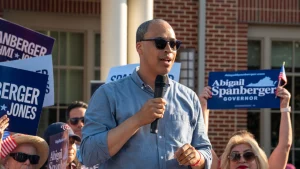Controversy Unfolds as President Trump Attempts to Block Federal Reserve Board Member Lisa Cook
In a recent development that has caught the attention of economic and political circles alike, Lisa Cook’s legal team has responded forcefully to President Trump’s unprecedented attempt to prevent her from participating in an upcoming Federal Reserve meeting. The lawyers submitted a court filing referencing news coverage about relevant records, asking a federal judge to rule against the President’s efforts. This situation marks a remarkable moment in the ongoing tension between presidential authority and the independence of the Federal Reserve, with significant implications for both economic policy and institutional governance.
The dispute centers around Cook’s role as a Federal Reserve Board member and her ability to fulfill her statutory responsibilities without political interference. Her attorneys argue that blocking her participation would not only harm Cook personally but could also disrupt the Fed’s essential decision-making processes at a critical economic juncture. The filing meticulously outlines legal precedents that have historically protected the Federal Reserve’s operational independence, suggesting that the President’s actions may overstep constitutional boundaries that separate executive power from independent regulatory agencies. This case ultimately raises profound questions about the balance of power within the American governance system.
What makes this situation particularly notable is its rarity in American financial governance. The Federal Reserve was designed specifically to operate with a degree of insulation from political pressures, allowing its members to make monetary policy decisions based on economic data rather than political expediency. Cook’s legal team emphasizes this point, noting that allowing a president to selectively block board members from participation could fundamentally undermine the institution’s ability to fulfill its dual mandate of maintaining price stability and maximizing employment. They argue that such interference creates dangerous precedent that could ripple through other independent agencies.
The court filing specifically references news reporting that appears to contradict the justification for blocking Cook’s participation. While the exact nature of these records remains somewhat obscured in public reporting, they apparently form a crucial part of Cook’s legal defense against what her team characterizes as an overreach of executive authority. The judge’s decision will likely hinge on interpretations of both statutory law governing the Federal Reserve and constitutional principles regarding separation of powers – with potential consequences extending far beyond this single case into questions about institutional independence in the American system.
This controversy unfolds against a backdrop of increasing political tension surrounding the Federal Reserve’s role in managing inflation and economic growth. Cook, who made history as the first Black woman to serve as a governor on the Federal Reserve Board, brings significant academic expertise in economics to her position. Her supporters argue that attempts to sideline her voice come at precisely the moment when diverse perspectives on monetary policy are most crucial. The case has drawn attention from economic analysts, legal scholars, and political observers who recognize its potential significance for future Fed operations and independence.
As the legal proceedings continue, broader questions emerge about the relationship between elected officials and independent regulatory bodies. The outcome could significantly influence not just Cook’s ability to participate in upcoming meetings but also establish precedent for how much influence a president can exert over ostensibly independent agencies. Financial markets, which typically respond negatively to perceptions of political interference in monetary policy, are watching closely. Whatever the court decides, this case highlights the delicate balance between democratic accountability and the technical expertise required for effective economic governance – a tension that has characterized American institutional design since its founding but takes on new urgency in today’s polarized political environment.







